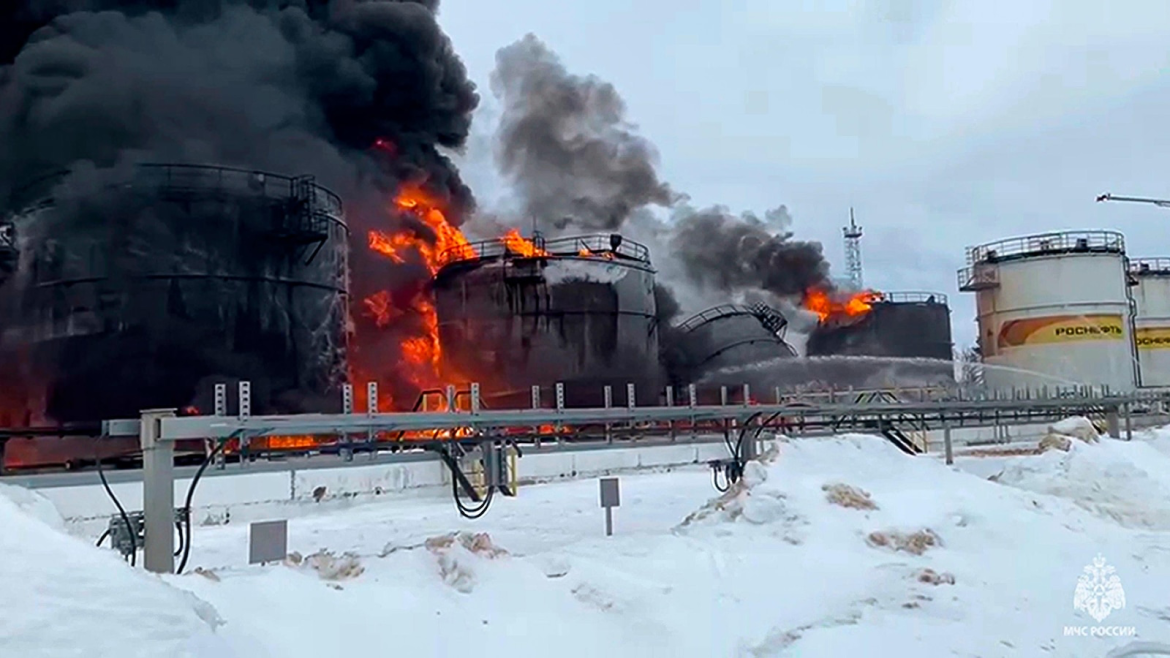A Ukrainian drone attack on a Russian oil and gas facility in the Baltic Sea has triggered a huge blaze and disrupted fuel exports to international markets.
The Ust-Luga complex, which is about 110 miles west of St. Petersburg on the Gulf of Finland, ships oil and gas products to global customers. It processes stable gas condensate – a type of light oil – into naphtha, kerosene, and diesel to be shipped by sea.
The fire broke out on Sunday after a drone hit one of the storage tanks, according to Ukrainian media reports. The Interfax-Ukraine news agency, citing unnamed sources, said the attack was a special operation carried out by Ukraine’s security services.
“An attack on such a terminal not only causes economic damage to the enemy but also complicates the logistics of fuel for the Russian military.”
A New Escalation in the War
The incident marks a new escalation in the war between Russia and Ukraine, which has been raging since 2014 when Moscow annexed Crimea and backed separatist rebels in eastern Ukraine.
The two sides have been targeting each other’s energy infrastructure in recent days, seeking to disrupt supply lines and inflict financial losses.
On Friday, a drone attack hit an oil depot in Russia’s western region of Bryansk, bordering Ukraine, for which Moscow blamed Kyiv. That came a day after an attack on a Russian Baltic Sea oil terminal that Russian officials said was unsuccessful.
Russia also accused Ukraine of shelling civilians in a Russian-held city in eastern Ukraine on Sunday, killing at least 25 people. Ukraine denied the allegation and said it was a provocation by Russia.
The attacks have raised fears of a wider Russian retaliation and a further deterioration of the fragile peace process, which has failed to end the conflict that has killed more than 14,000 people.
The Impact on the Energy Market
The fire at the Ust-Luga complex has forced Russian energy company Novatek, the country’s largest liquefied natural gas producer, to suspend some operations at the facility.
Novatek said in a statement it had stopped the technological process at Novatek-Ust-Luga and set up an operational headquarters to deal with the consequences.
The Ust-Luga complex is a key export hub for Russia, which is one of the world’s largest oil and gas producers and exporters. Novatek processed 3.4 million tons of stable gas condensate at the complex in the first half of 2023, according to the most recent data available.
The fire could affect the supply and prices of oil and gas products in the international market, especially in Europe, which relies heavily on Russian energy.
Despite the rising tensions and violence, there is still hope for a peaceful resolution of the conflict. The leaders of Russia, Ukraine, France, and Germany, known as the Normandy Four, have agreed to hold a summit in February to discuss ways to implement the 2015 Minsk peace agreements, which call for a ceasefire, a withdrawal of heavy weapons, and a political settlement.
The summit will be the first meeting of the four leaders since December 2019, when they made some progress on prisoner exchanges and a partial disengagement of forces. The summit will also be an opportunity for dialogue and cooperation on other issues of mutual interest, such as the fight against climate change and the pandemic.
The international community, including the United States and the European Union, has also expressed its support for the peace process and urged both sides to refrain from further escalation and provocations. The UN Security Council has called for an immediate and full ceasefire and respect for international law and human rights.
The fire at the Ust-Luga complex was a tragic and alarming incident, but it should not overshadow the efforts and hopes for a peaceful and prosperous future for both Russia and Ukraine.
Source: Reuters



